A new 28-unit, $7.4 million affordable housing complex has opened for senior citizens and disabled residents in Weehawken. Located at 4800 Park Ave., it replaces the infamous Park Avenue Hotel (also known as the Bach Hotel), described by officials at the ribbon-cutting ceremony on Feb. 3 as an “eyesore” and “a detriment to the neighborhood.”
In addition to the 28 one-bedroom apartments, the new four-story facility will feature 1,800 feet of retail space. It was designed to fit into the existing architecture of the neighborhood, at a cost of $7,380,000.
Each apartment includes a pull-cord in the wall so residents can quickly and easily contact authorities in the event of an emergency. Several apartments were specifically designed to be handicapped-accessible, with specially designed bathrooms and kitchens to accommodate wheelchairs.
“Unfortunately we’ve had some very bad events in this hotel as the criminal element moved in over the years.” – Mayor Richard Turner
____________
History of crime and murder
It was a long journey to get to the current building. The township first petitioned to have the Park Avenue Hotel condemned in 2009 after a protracted slide from respectability into vice.
Weehawken Mayor Richard Turner described the early days of the building as a 32-room single occupancy hotel (SRO) with one bathroom on each floor, back when the area was rife with railroads and shipping.
“Over the years as those industries died, the building became what you would call a flophouse,” he said. A liquor store on the ground floor was shut down repeatedly by the Alcoholic Beverage Control Board and police for allegedly selling to minors and violating liquor laws.
And then there were the crimes conducted on the premises. “Unfortunately we’ve had some very bad events in this hotel as the criminal element moved in over the years,” said Turner. “We’ve had people move in and do robberies out of the building. We’ve had people move in and leave their babies abandoned.”
Most notorious was the murder of 18-year-old Bergen County resident Jennifer Moore in the building in 2006. A man and woman picked up Moore in New York City after she had been at a bar with a friend and needed to get back to New Jersey. She was beaten and strangled to death in the hotel. Her body was found in a trash bin in West New York.
Turner described the process of condemning the building as a difficult legal struggle that took two years. After that the process began to relocate the residents and businesses, and then demolish the existing structure and remove asbestos and other materials.
Housing Director Dominic Facchini has been with the project since inception and said that among the many problems faced in putting up the new facility was excavating the solid rock that made up the foundation.
“Basically we found the Palisades right here,” he said. “But that’s not challenging enough. The bigger challenge was that we built directly above a tunnel. So most of that rock had to be chiseled by hand.”
Complicating issues, the initial contractor went bankrupt. Subsequent companies brought with them a litany of other problems.
“Eventually the board kicked them all out and took over control themselves and got the building done,” said Turner.
Donuts and paradise
Mayor Turner thanked a long list of agencies, groups, and individuals who helped to bring the project to fruition and contribute to the revitalization of the neighborhood.
Chief among them was County Executive Tom DeGise, who spoke briefly at the ribbon-cutting, noting the increasing difficulty of these types of projects considering the ongoing cuts to federal funding.
“Every year we’re being asked to do a little bit more with a little bit less,” he said, although the county continued to look for opportunities to partner with municipalities on similar projects.
Of this particular project, he joked that, “This is a perfect place for senior housing. There’s a Dunkin Donuts right across the street.”
“I cannot think of a better place to build a senior citizen establishment than the area that we are now standing in,” agreed Deputy Mayor and 3rd Ward Councilman Robert Sosa, who lives a block away from the new building and pushed relentlessly to get the project completed. “Within a three-block radius of this very spot, you can walk to over 60 mom-and-pop stores,” he said, listing everything from restaurants to beauty parlors to nail salons and government services, as well as many mass transportation options.
Victoriano and Emma Ramos have been married 51 years and raised six kids in Weehawken after moving here from Santo Domingo. They were displaced from their home on Clifton Terrace by a fire in December 2014 and have been living with relatives ever since. Victoriano was effusive in his thanks to the mayor, town council, and others for finding them a new home.
“It was tough,” he said through an interpreter. “But I love my life now. For me, this is paradise.”
Turner described several other new residents, including a blind individual previously living on the third or fourth floor of a walk-up building. His life, Turner said, will be improved immeasurably simply by having an elevator to get him in and out of his apartment.
Another new tenant is town resident Gustavo, who is looking to retire. “Gustavo’s always had a view of Manhattan,” said Turner. “So he said, ‘I don’t want a view of Manhattan. I want to look at Dunkin Donuts.’”
Apartments were selected by lottery, and lucky Gustavo got his wish. When he moves into his new digs, he’ll be facing Dunkin Donuts.
Art Schwartz may be reached at arts@hudsonreporter.com.
